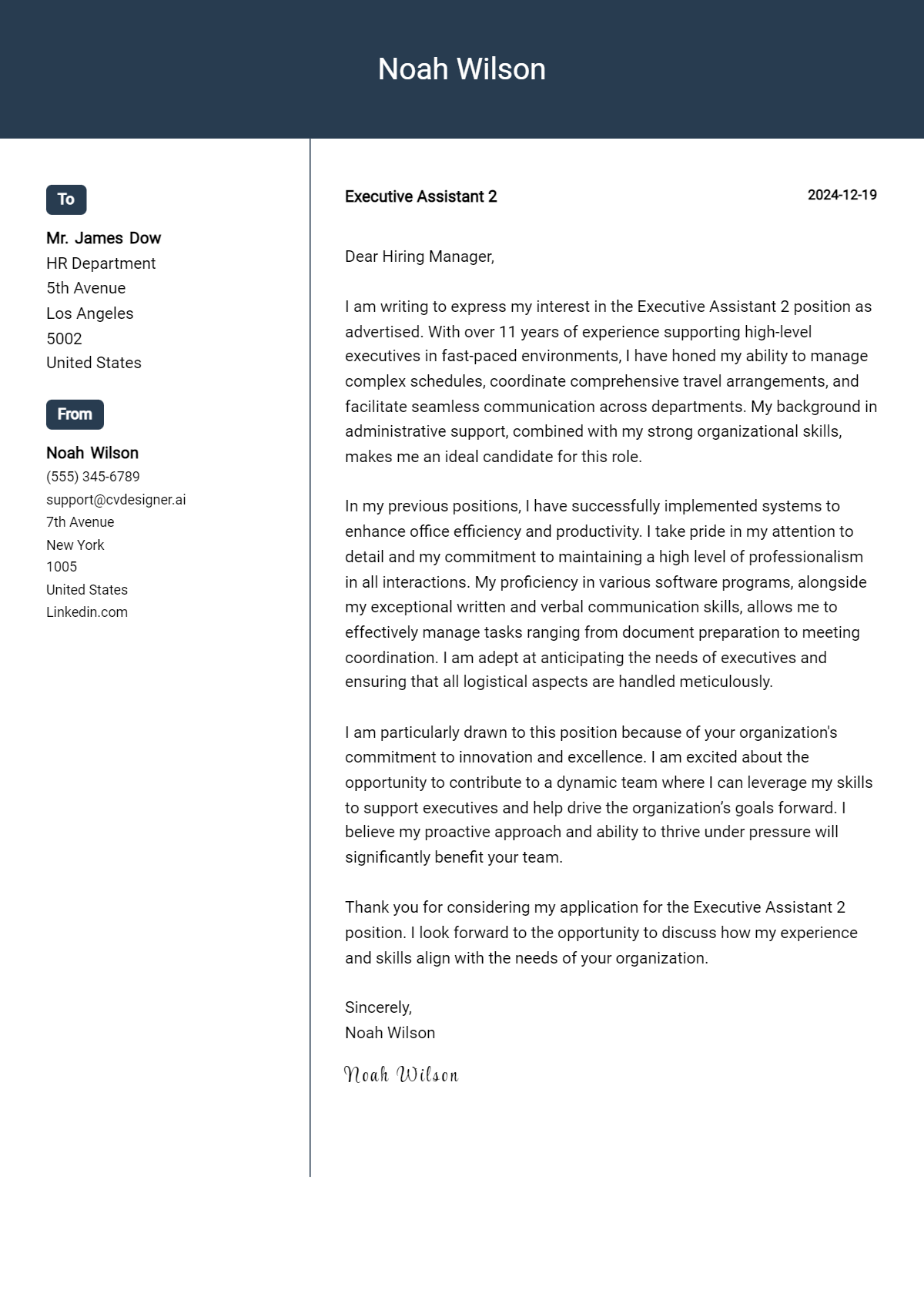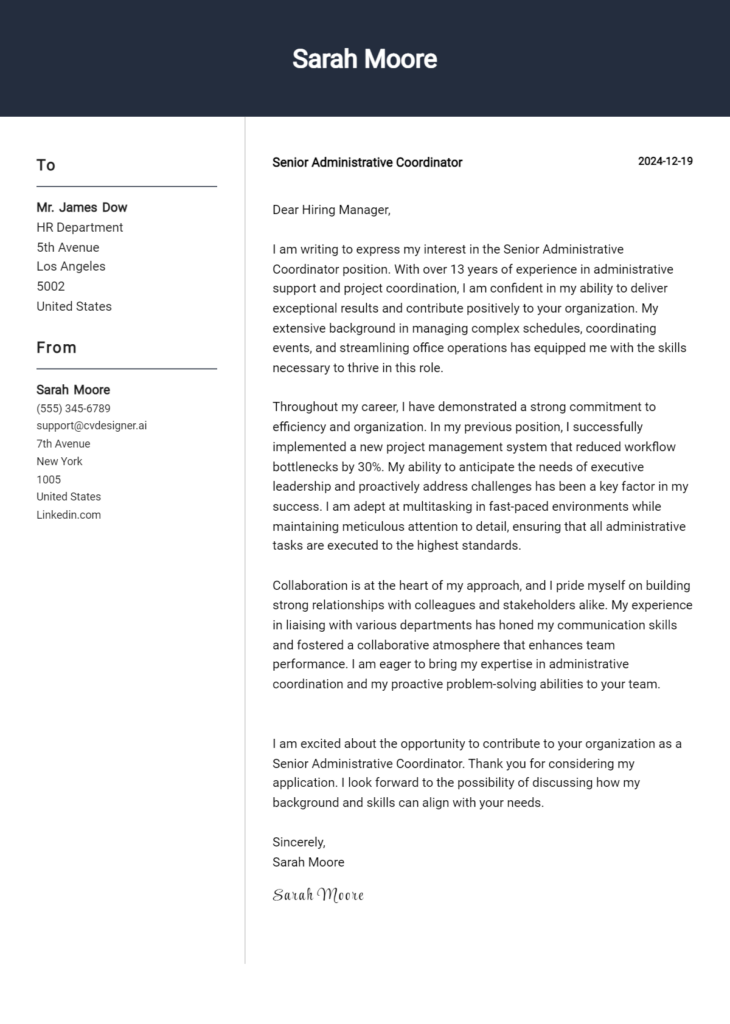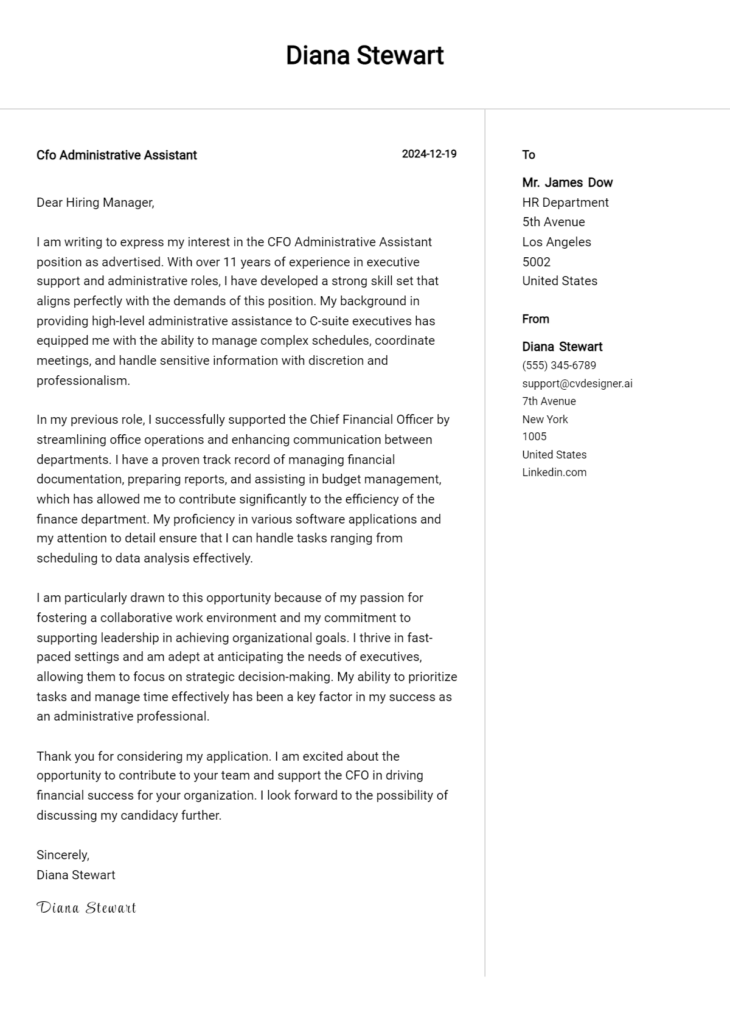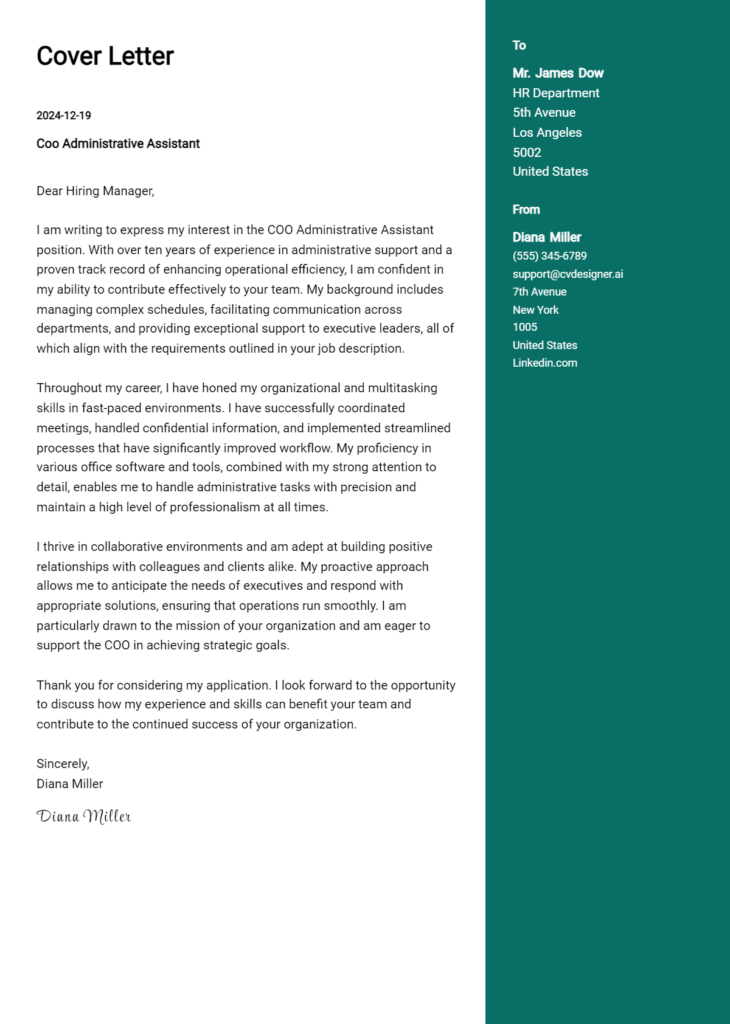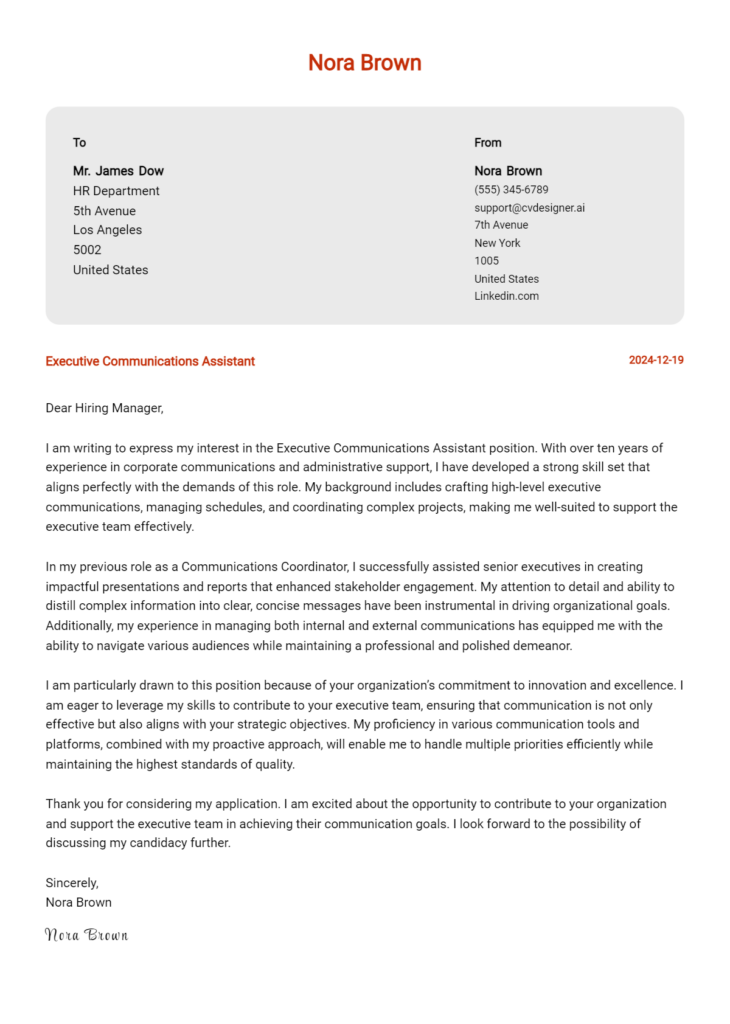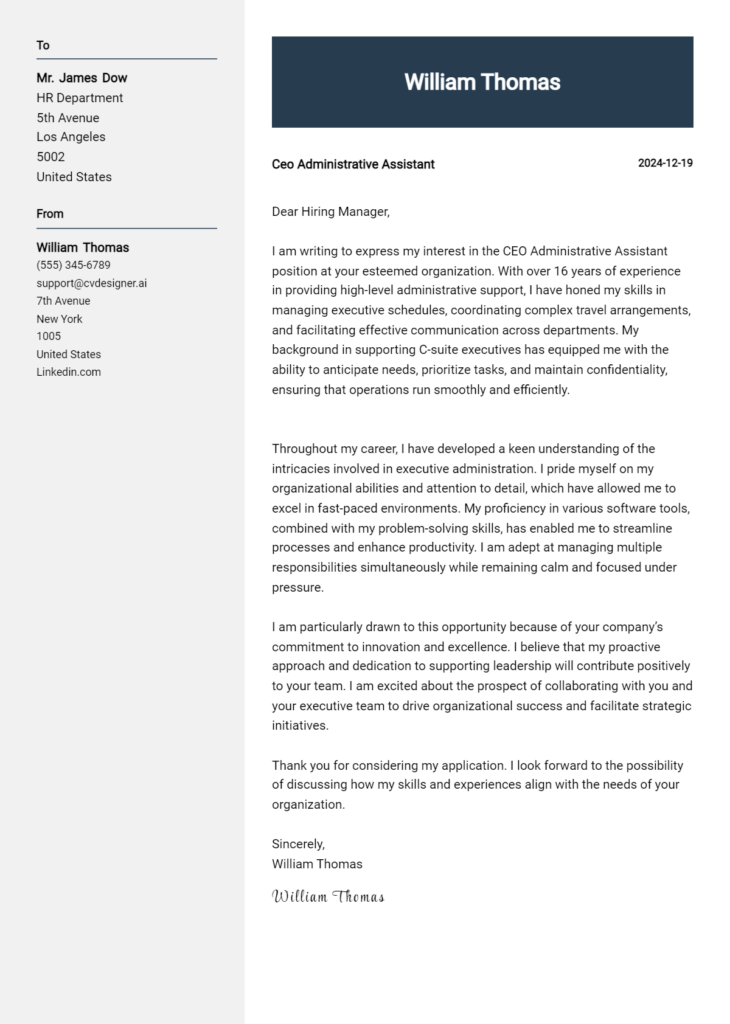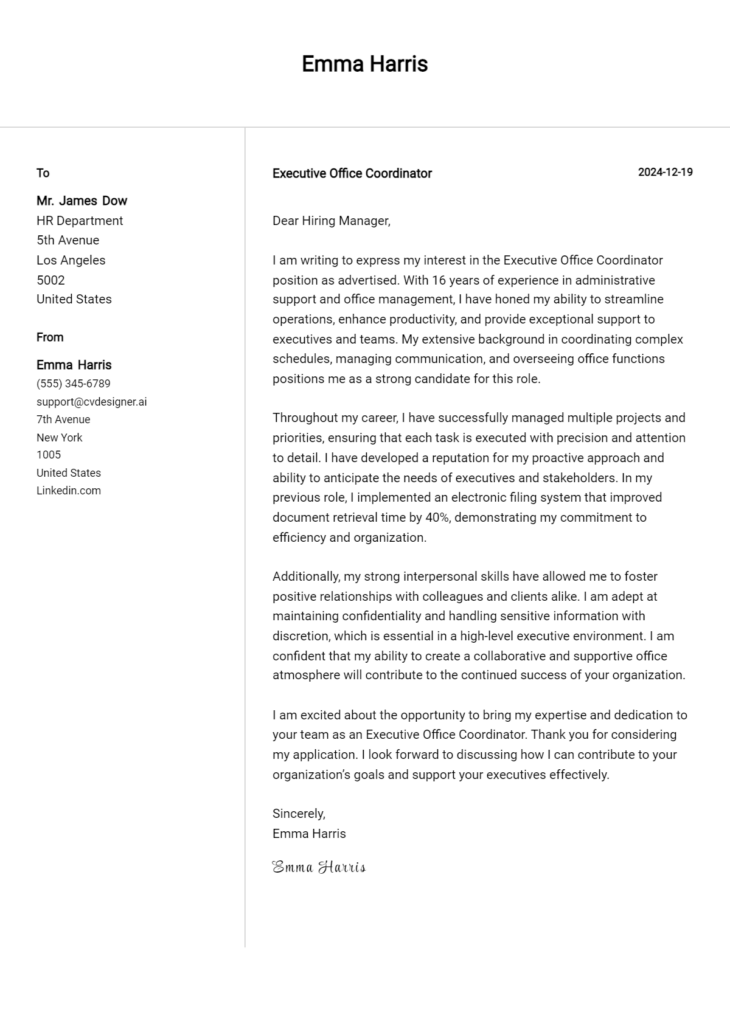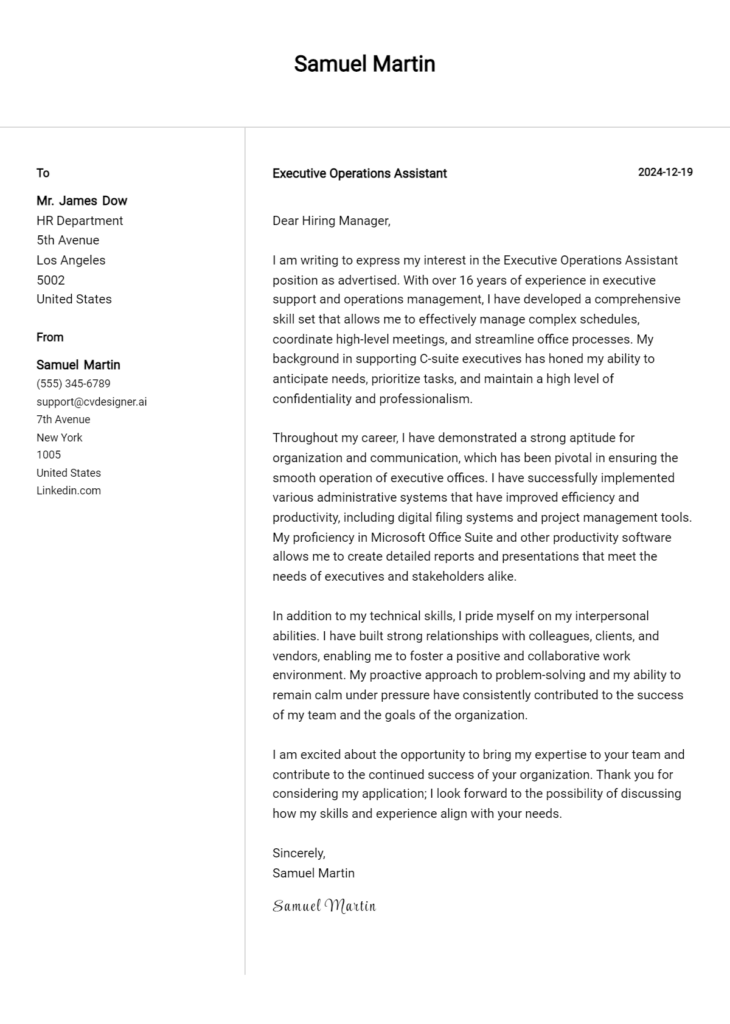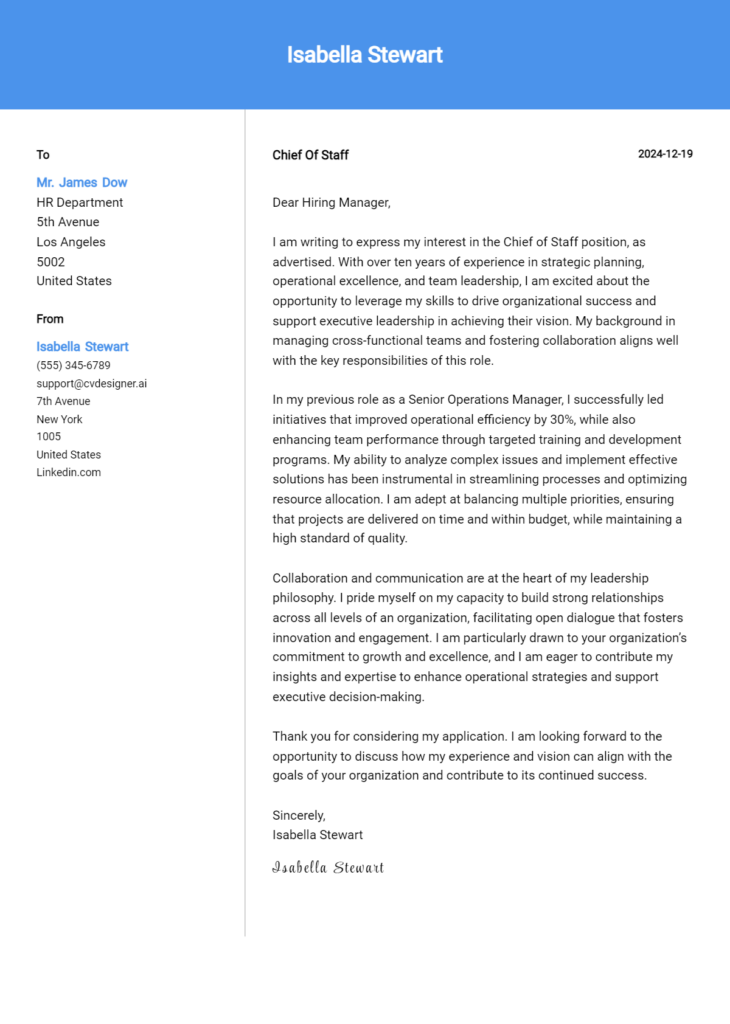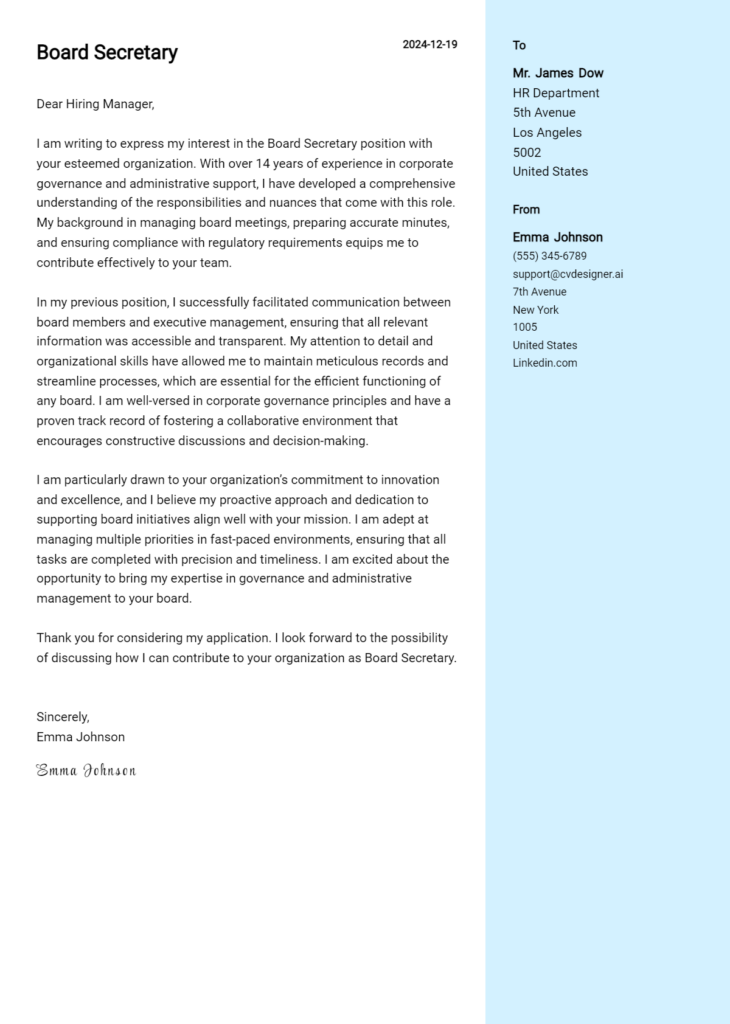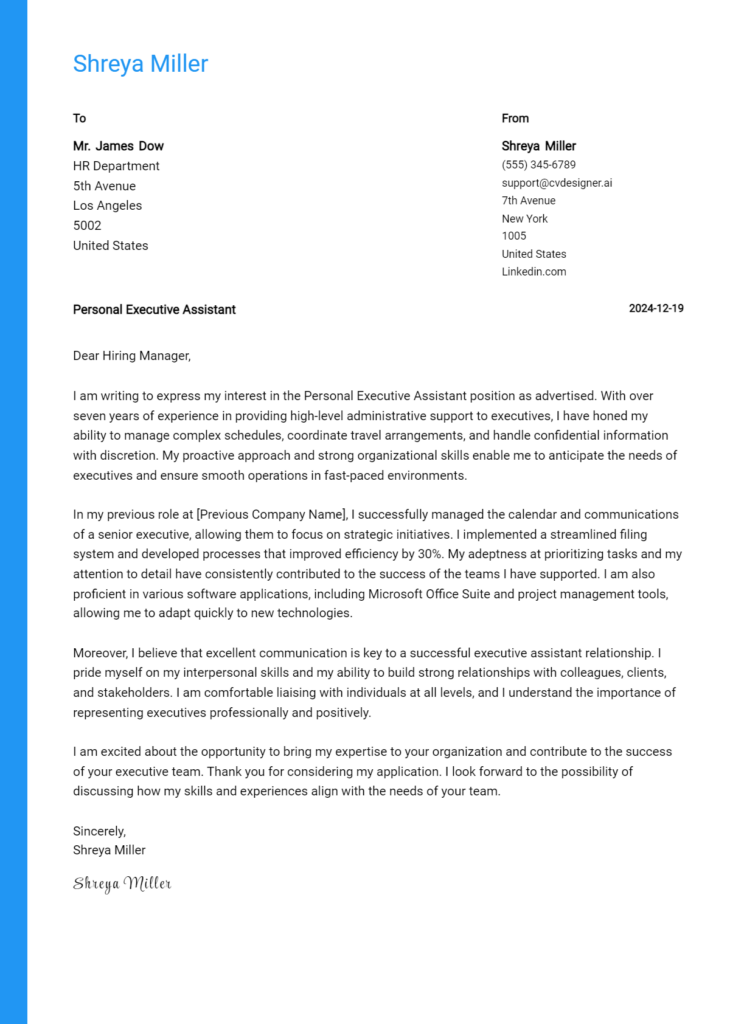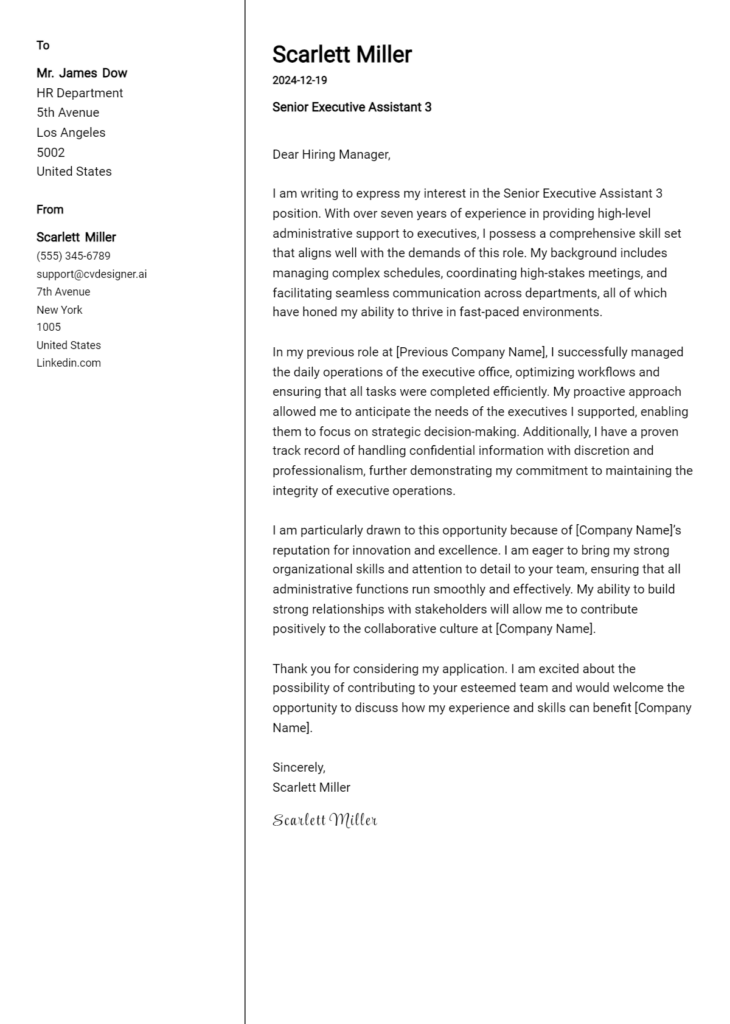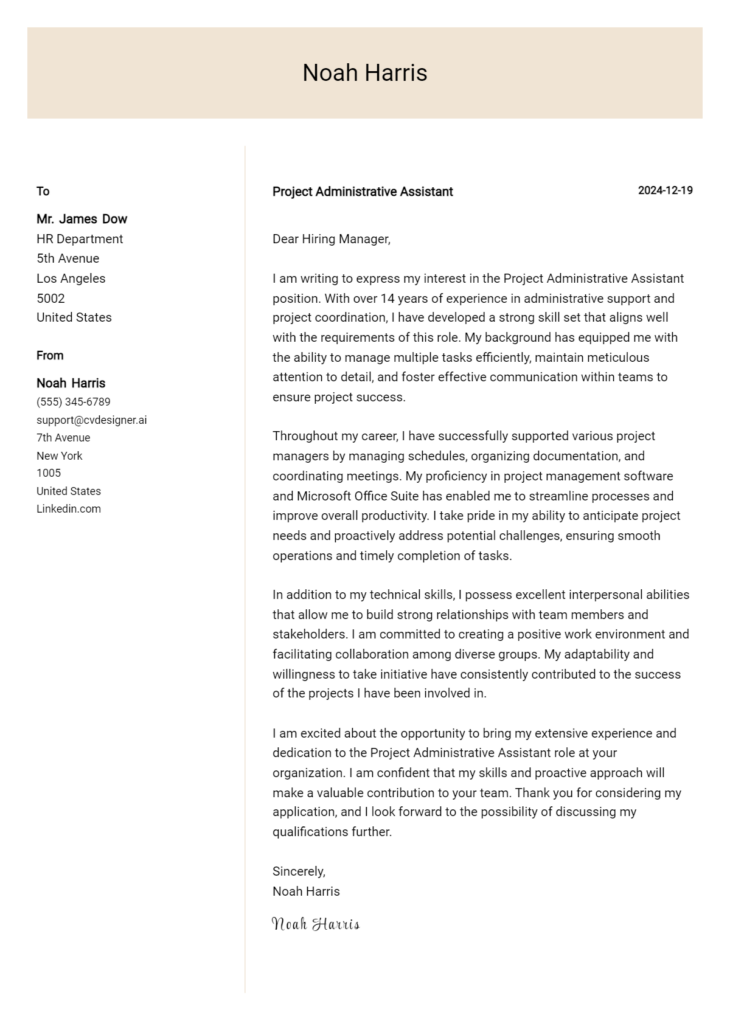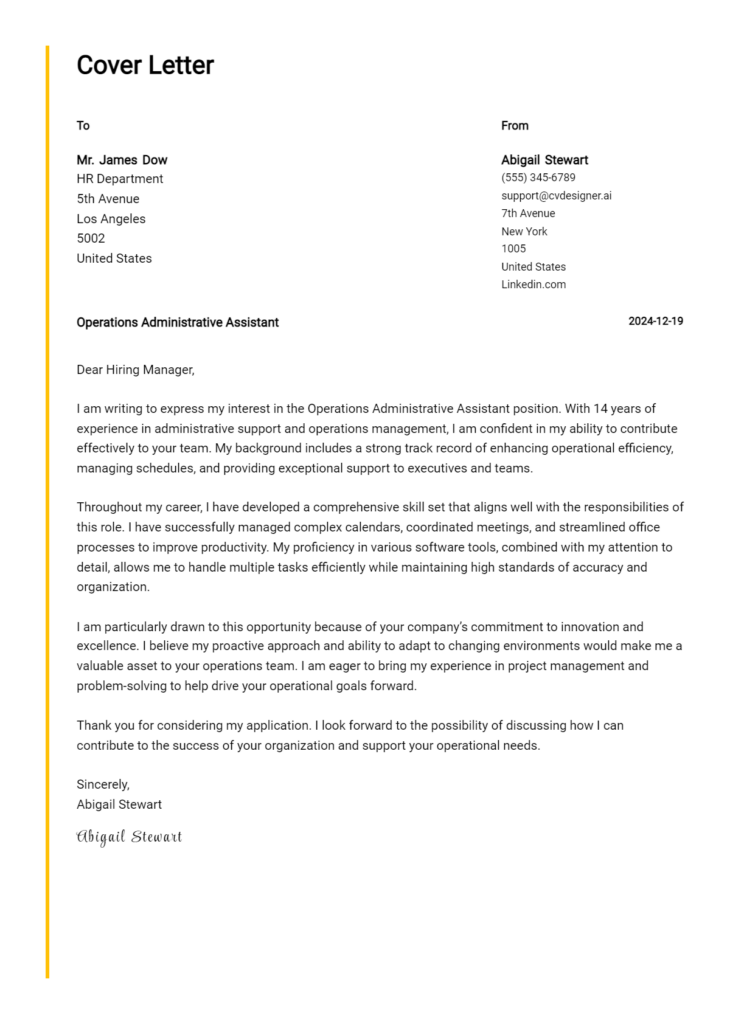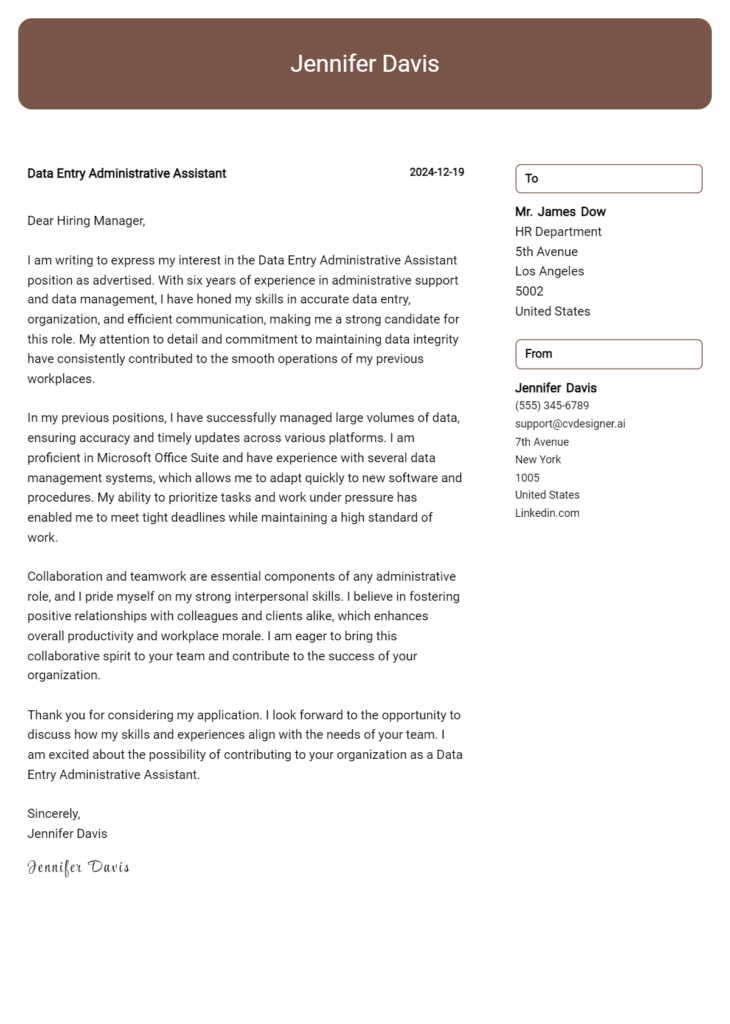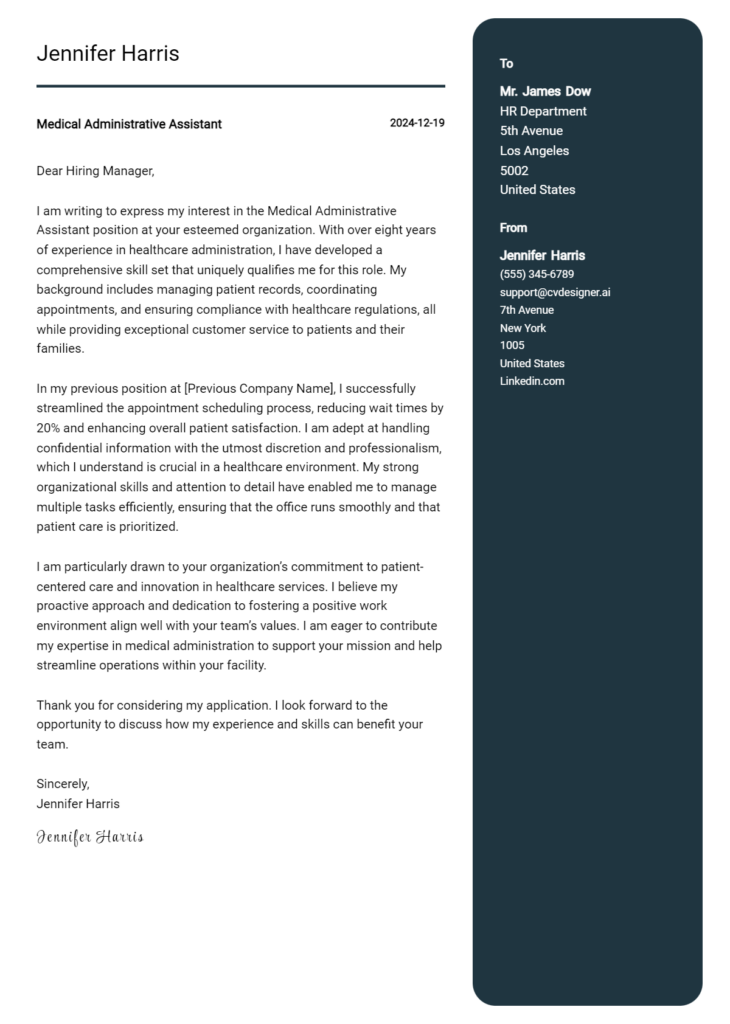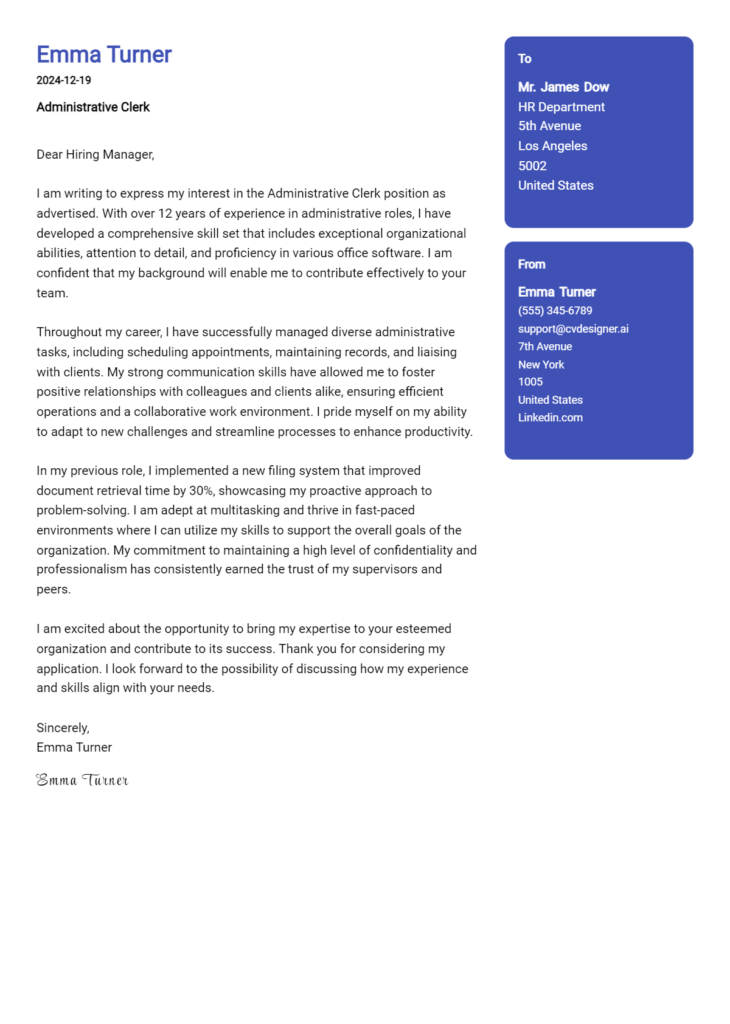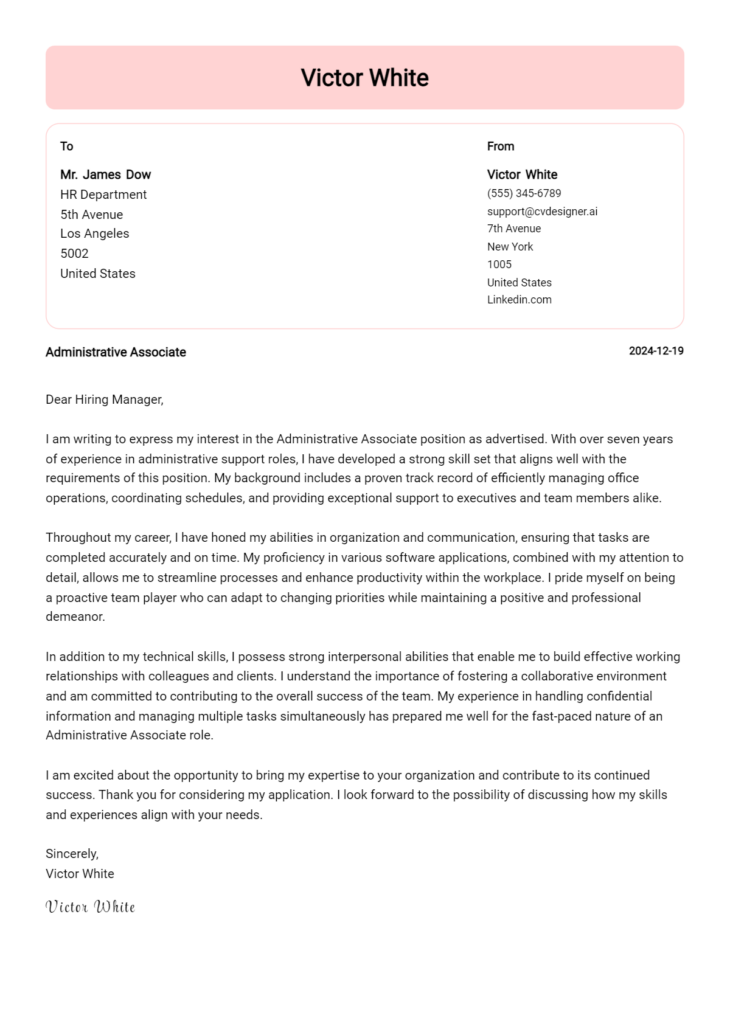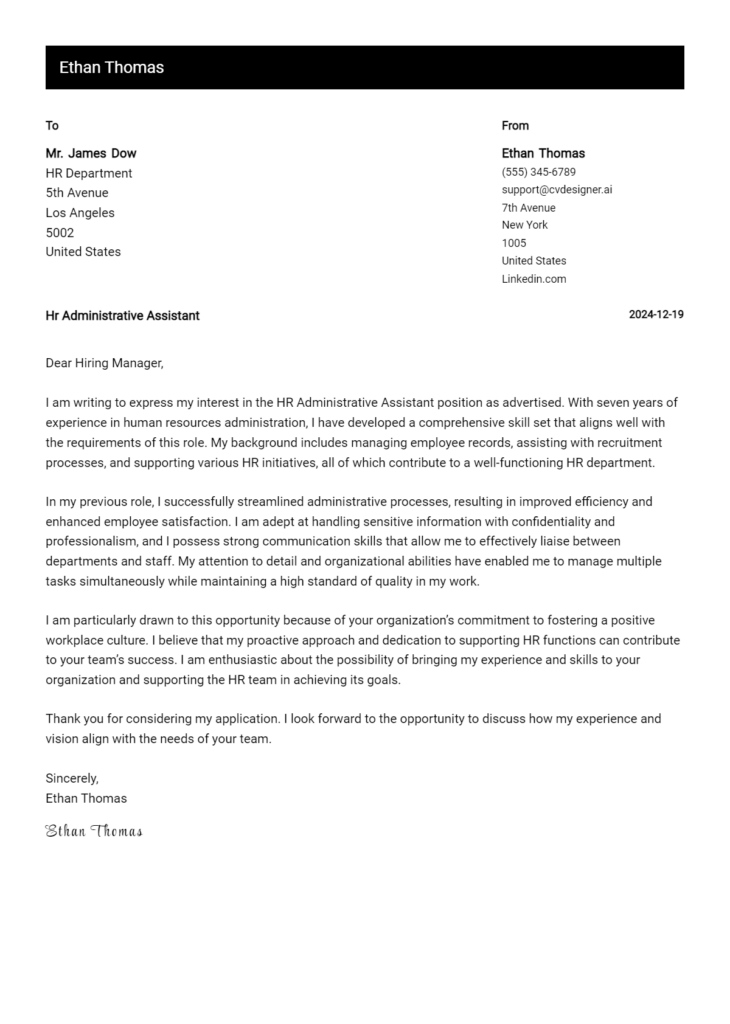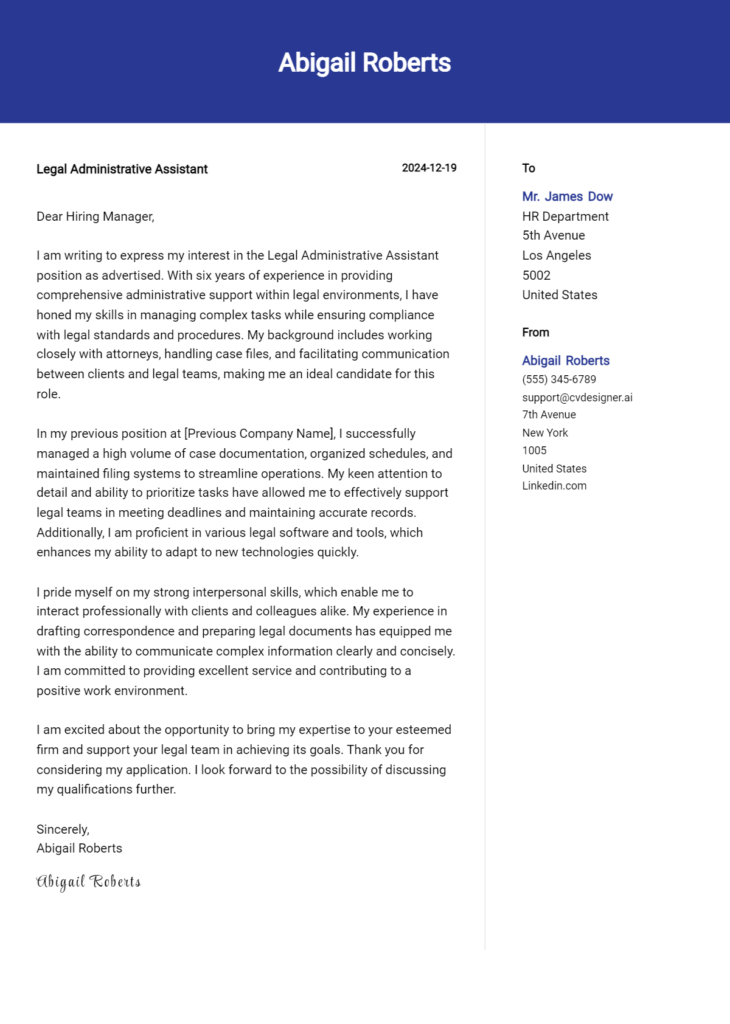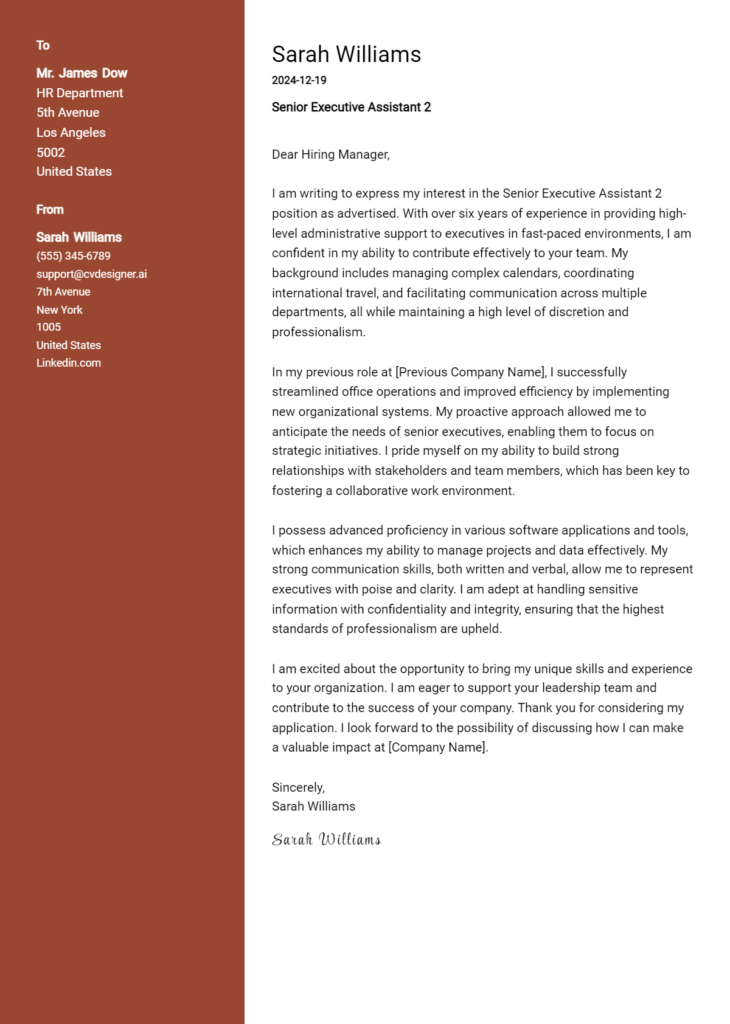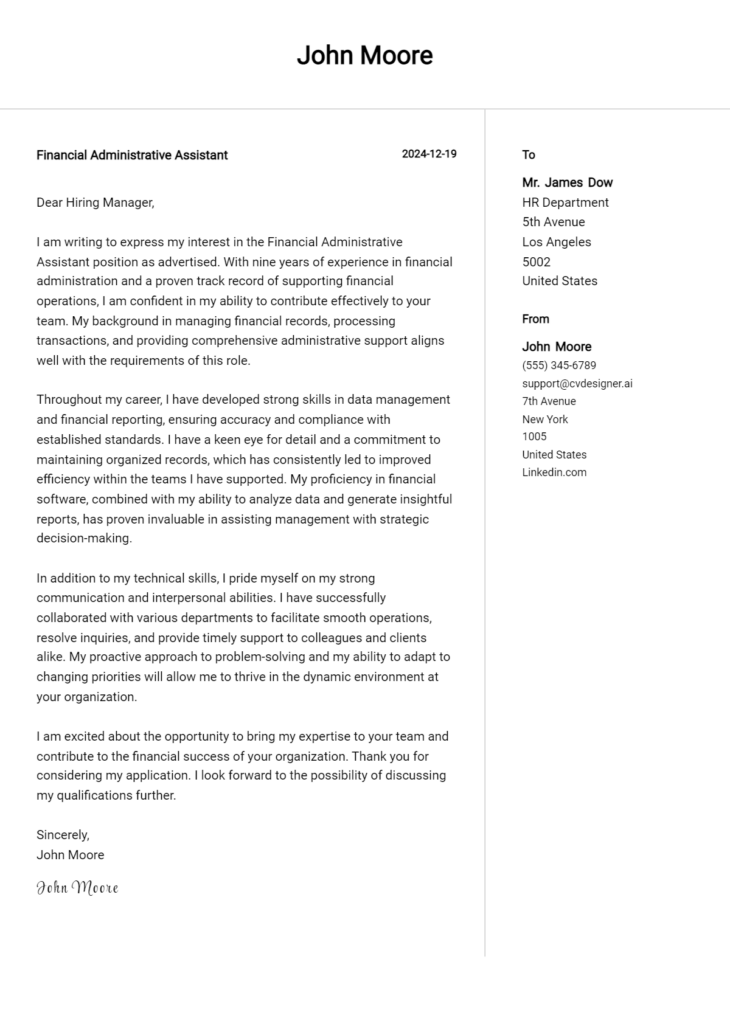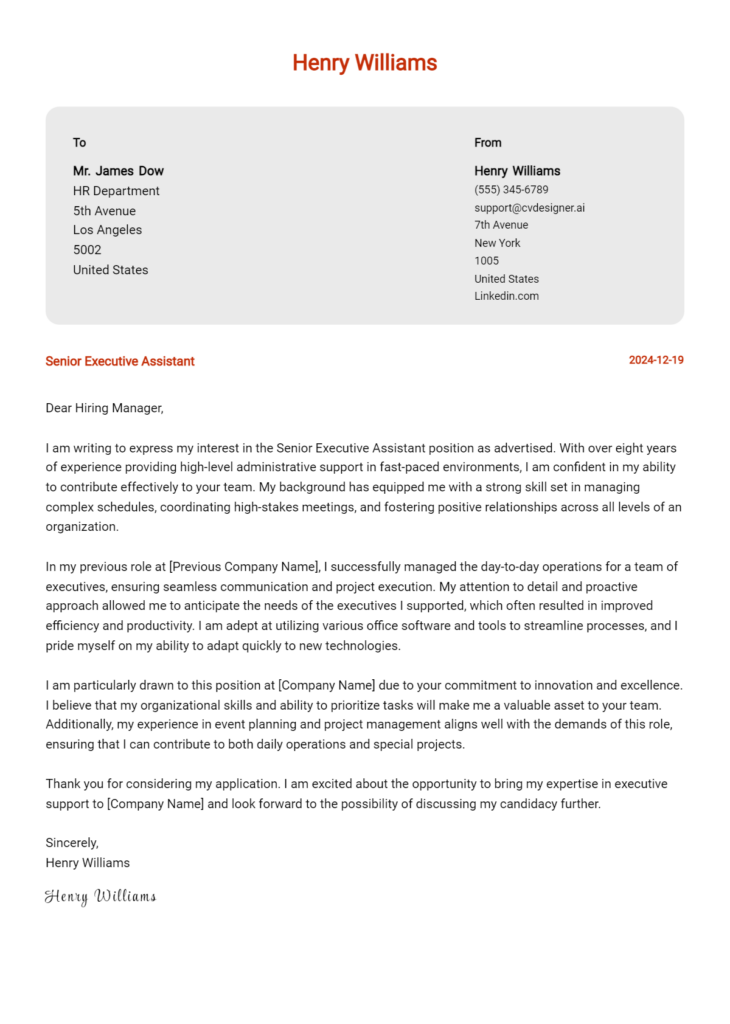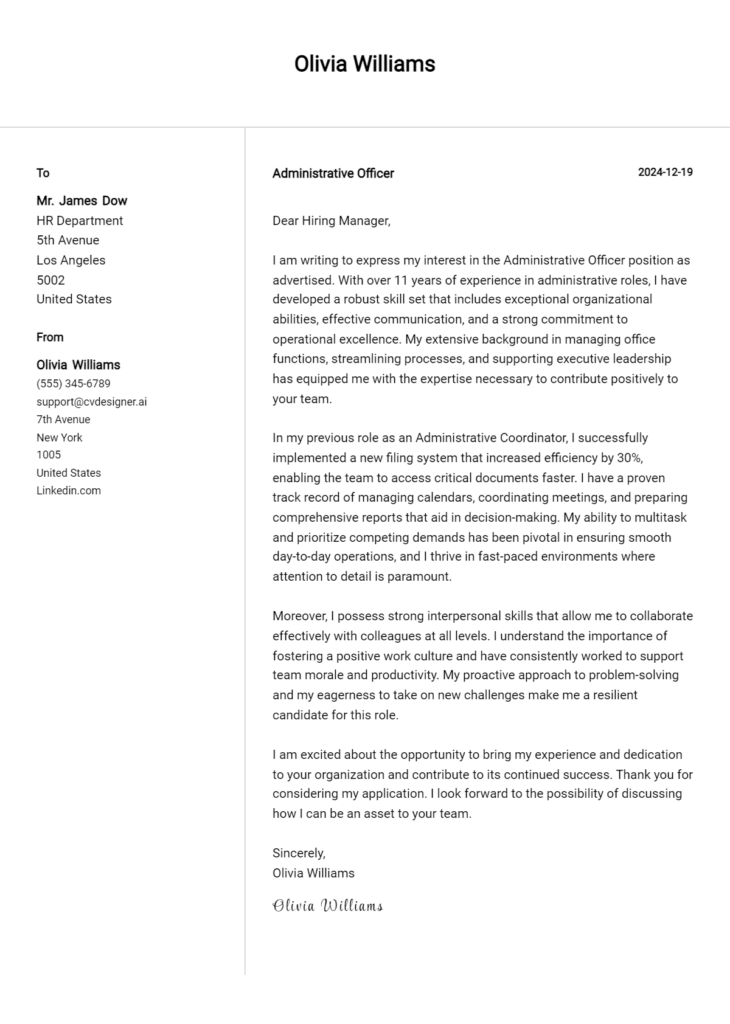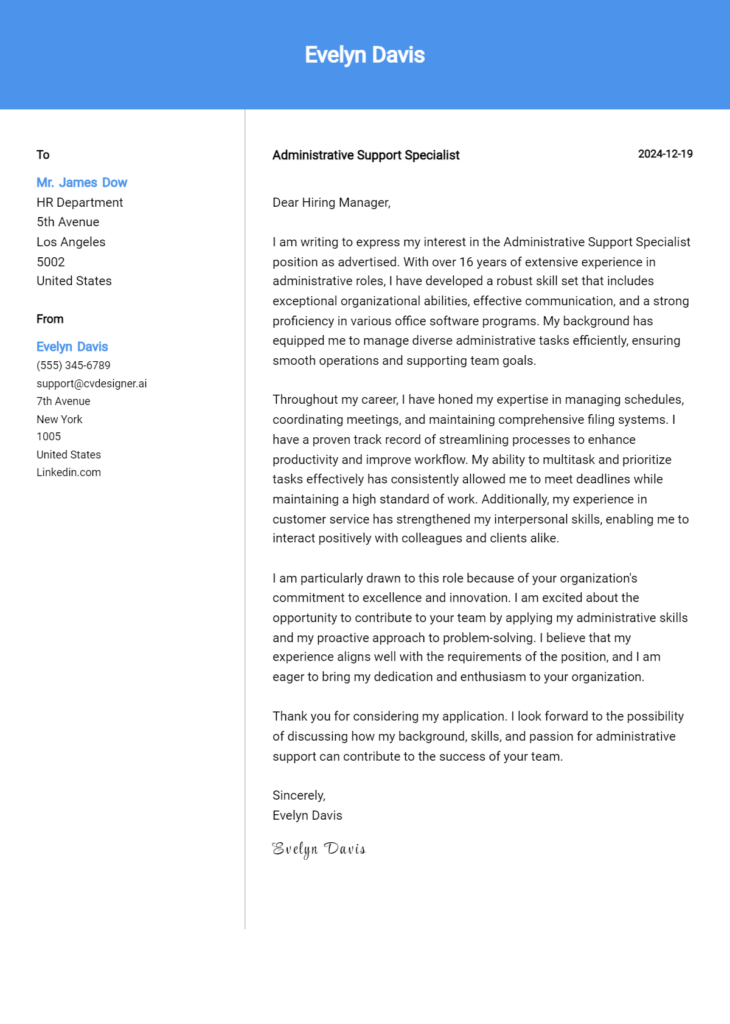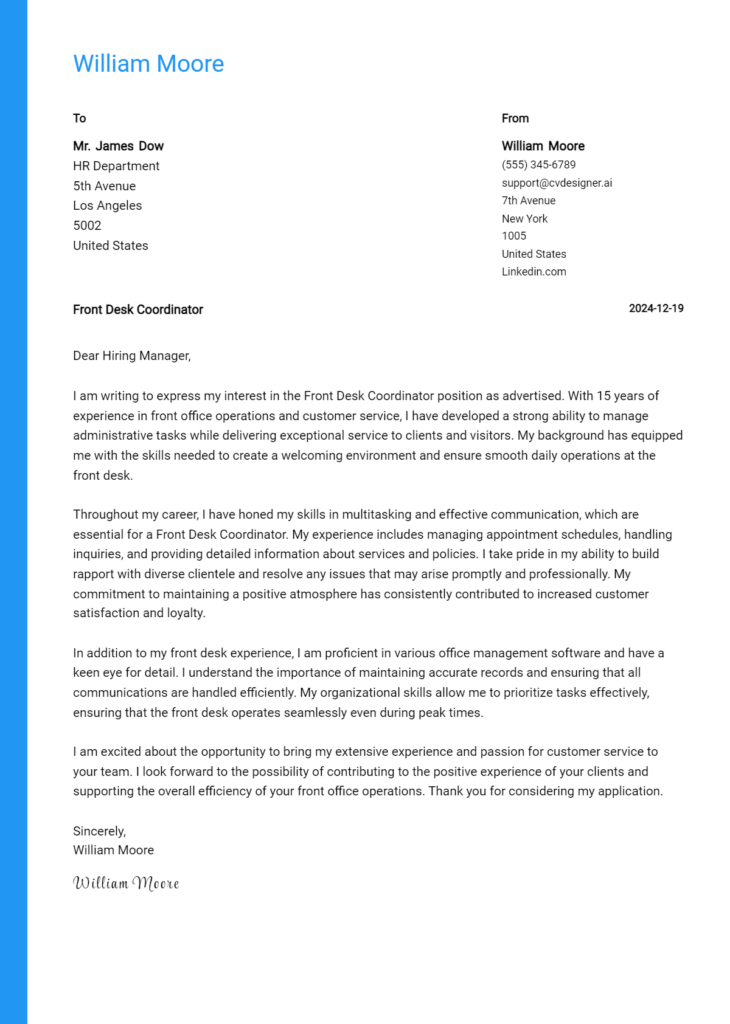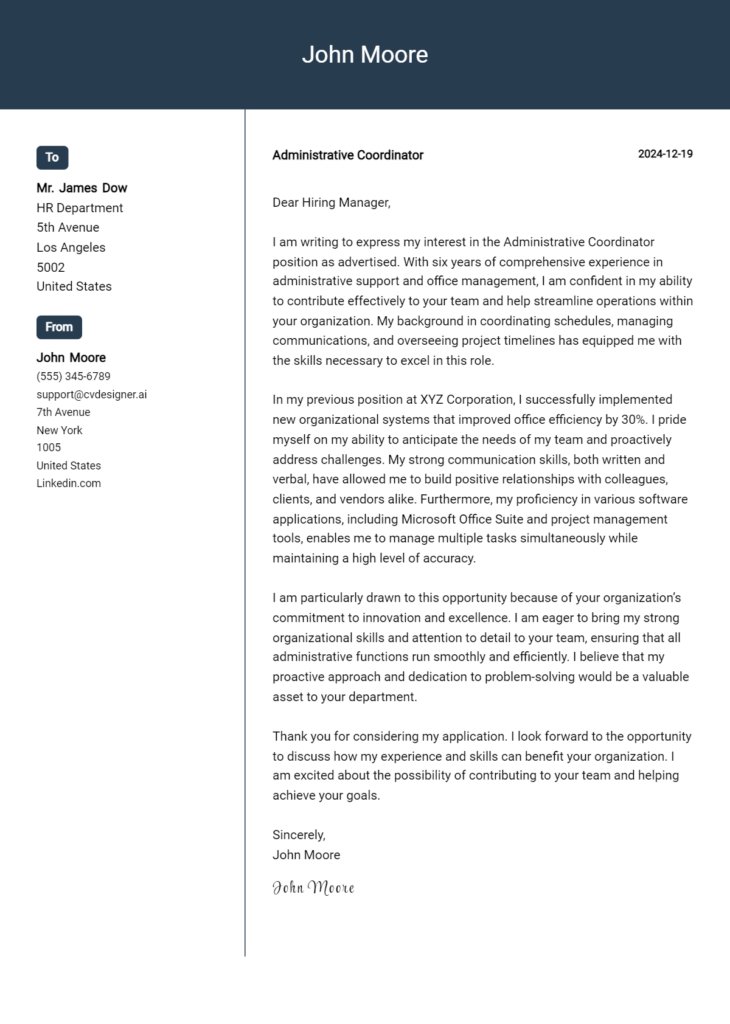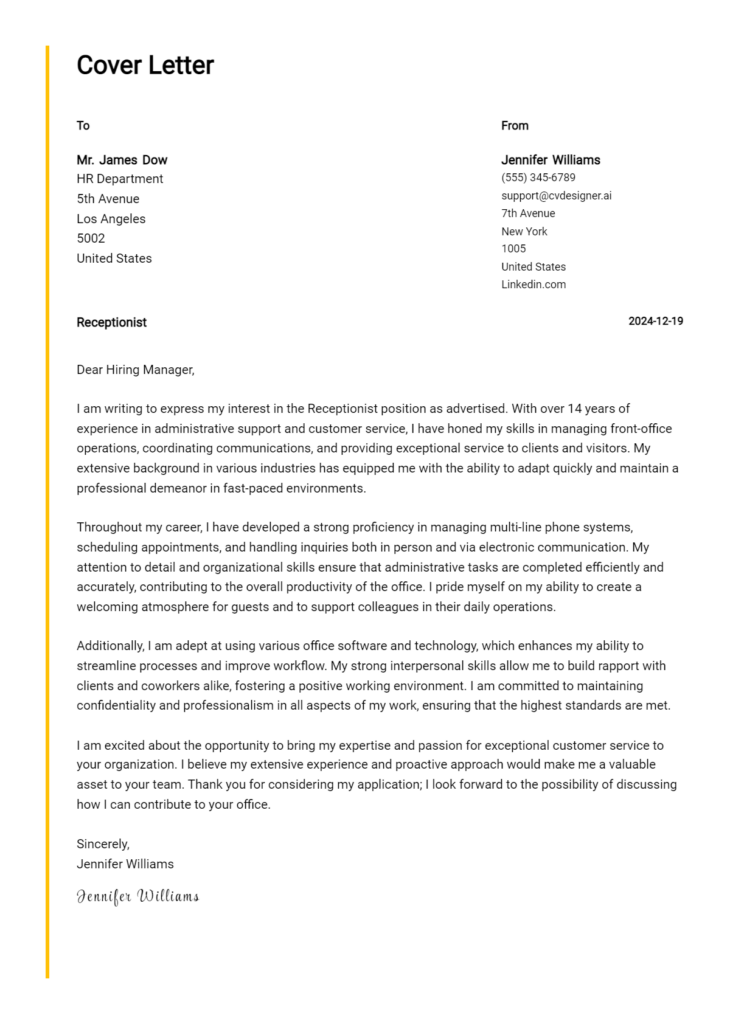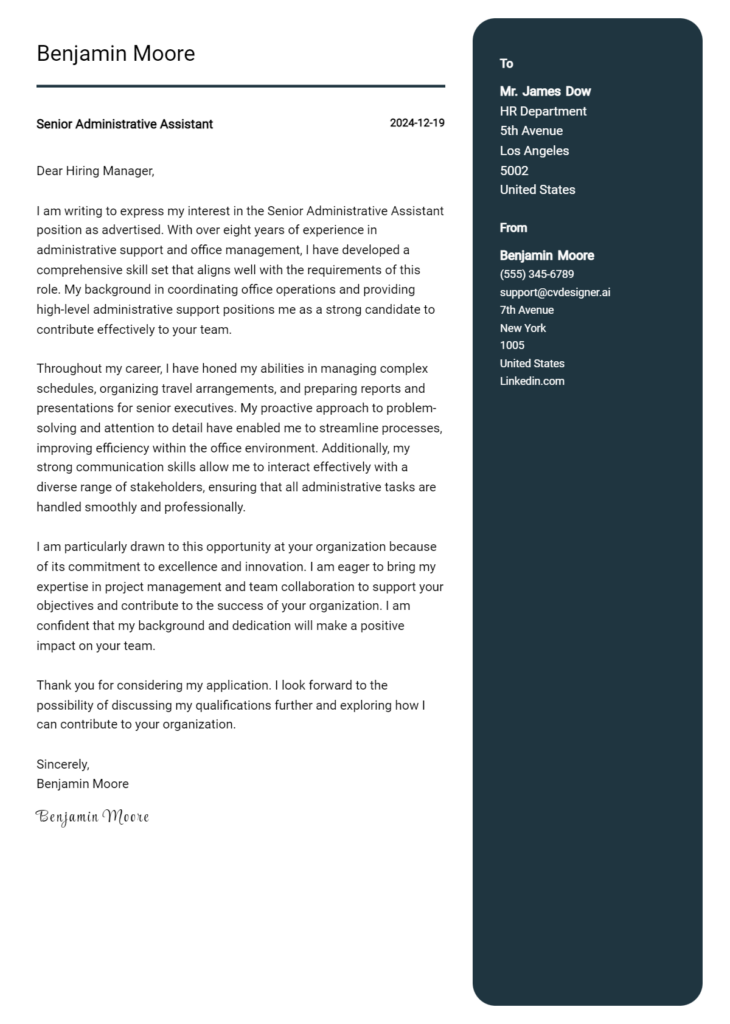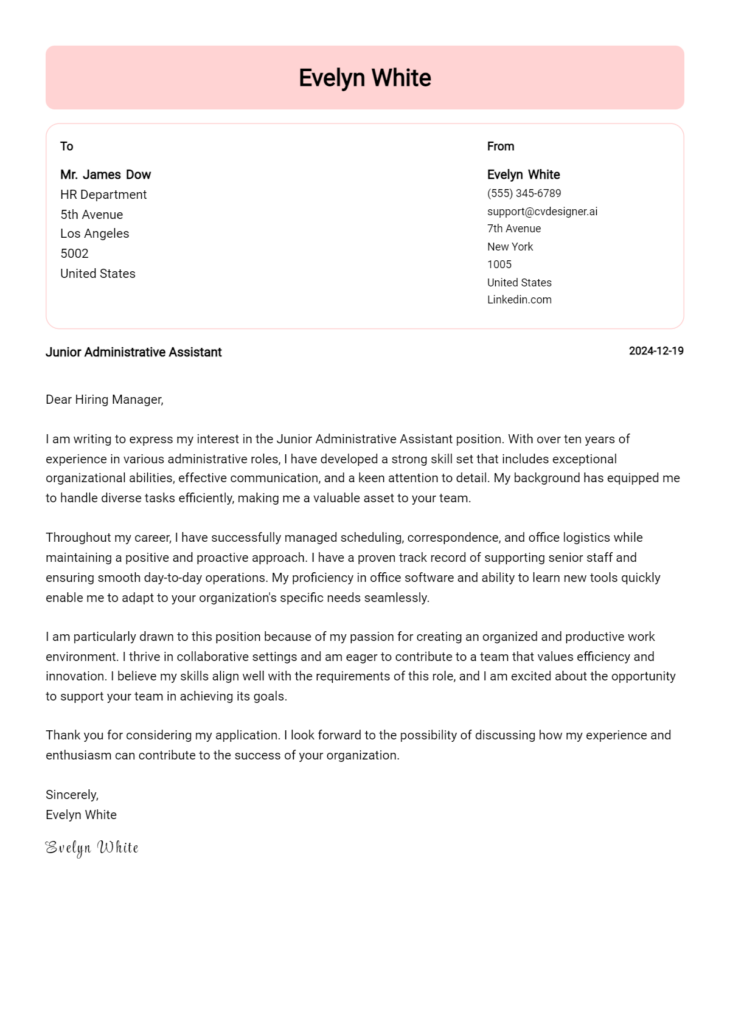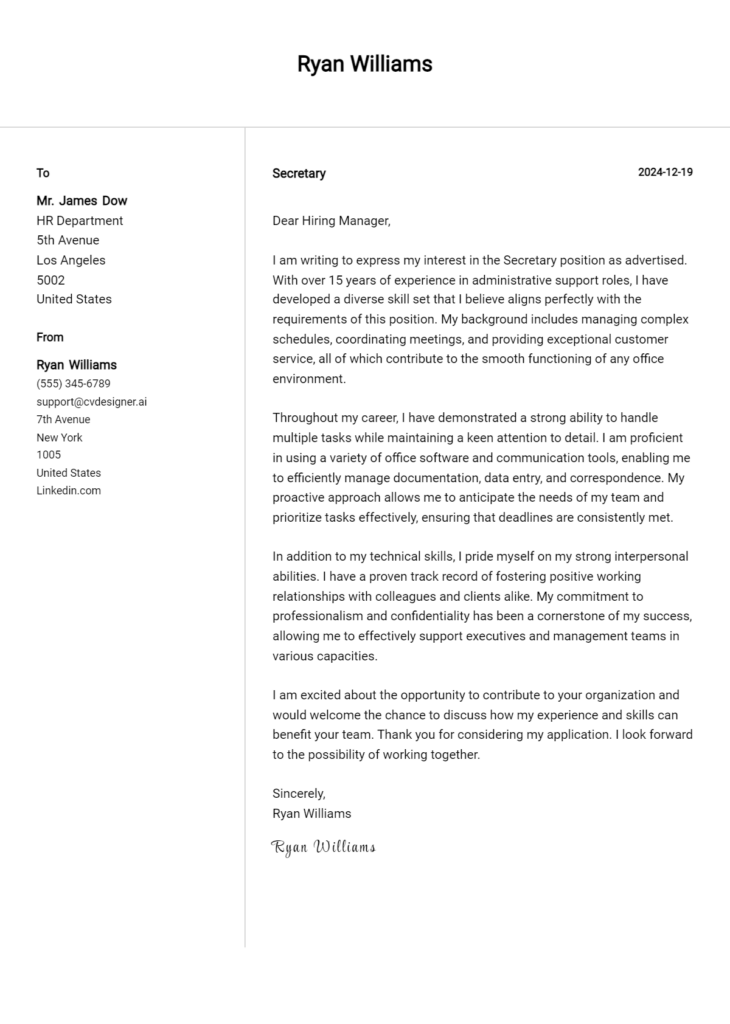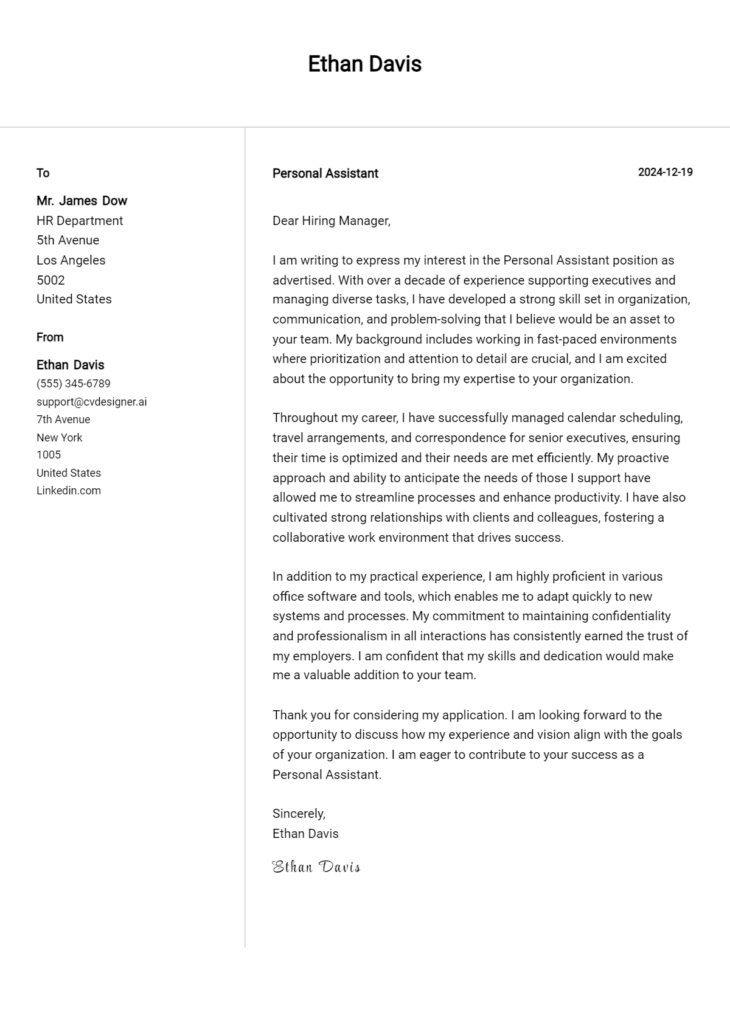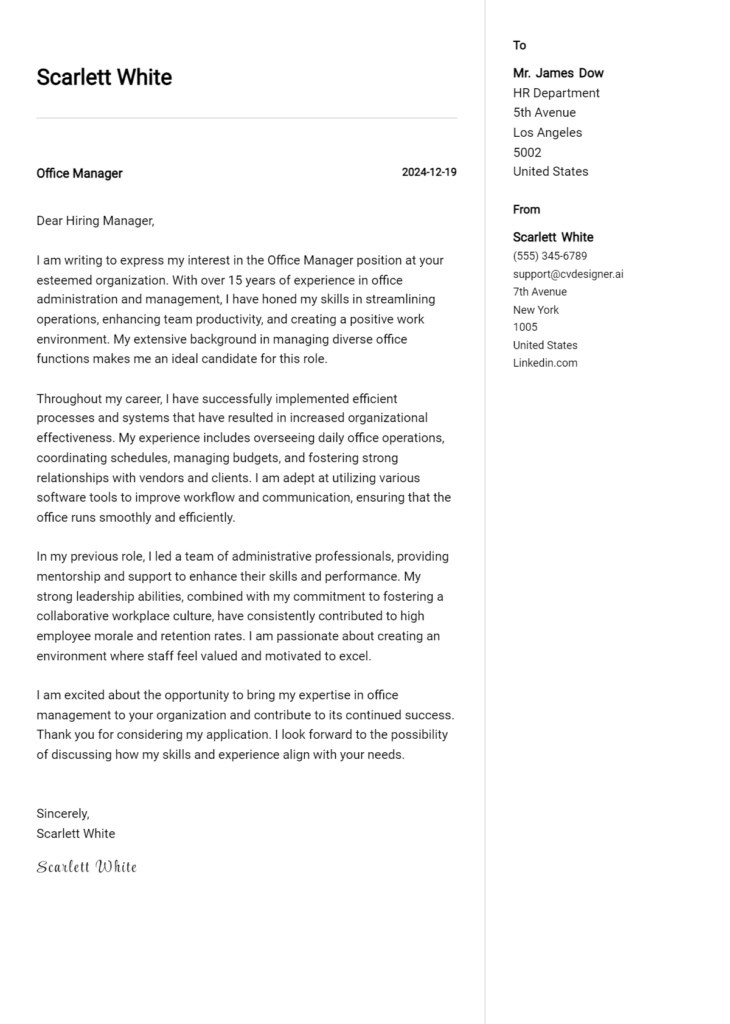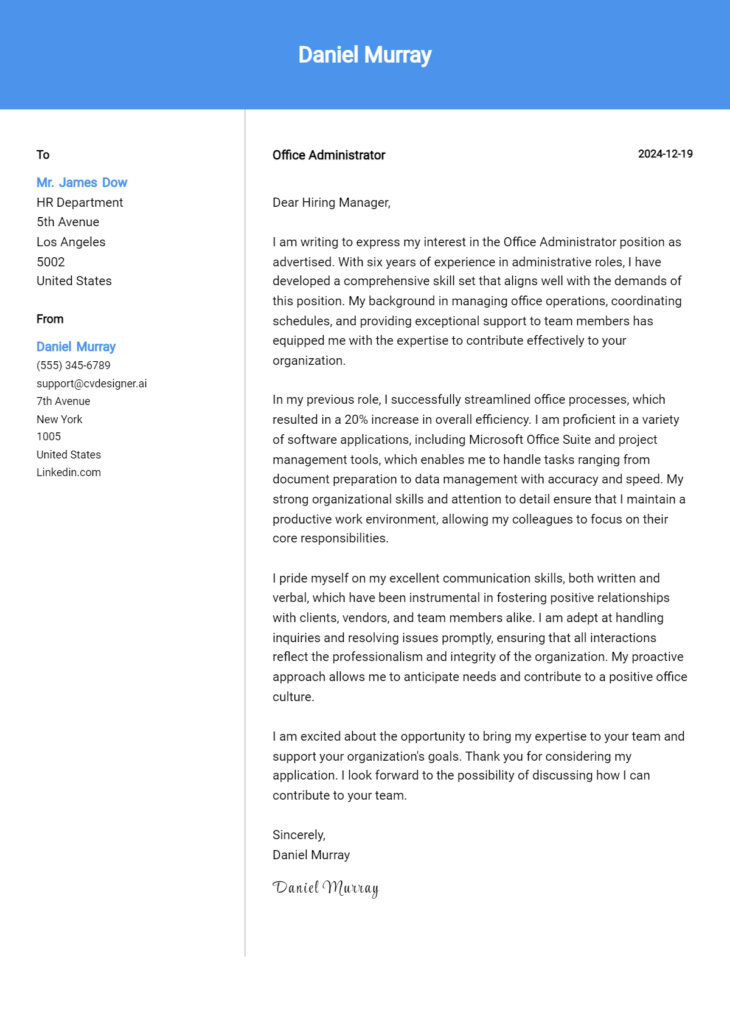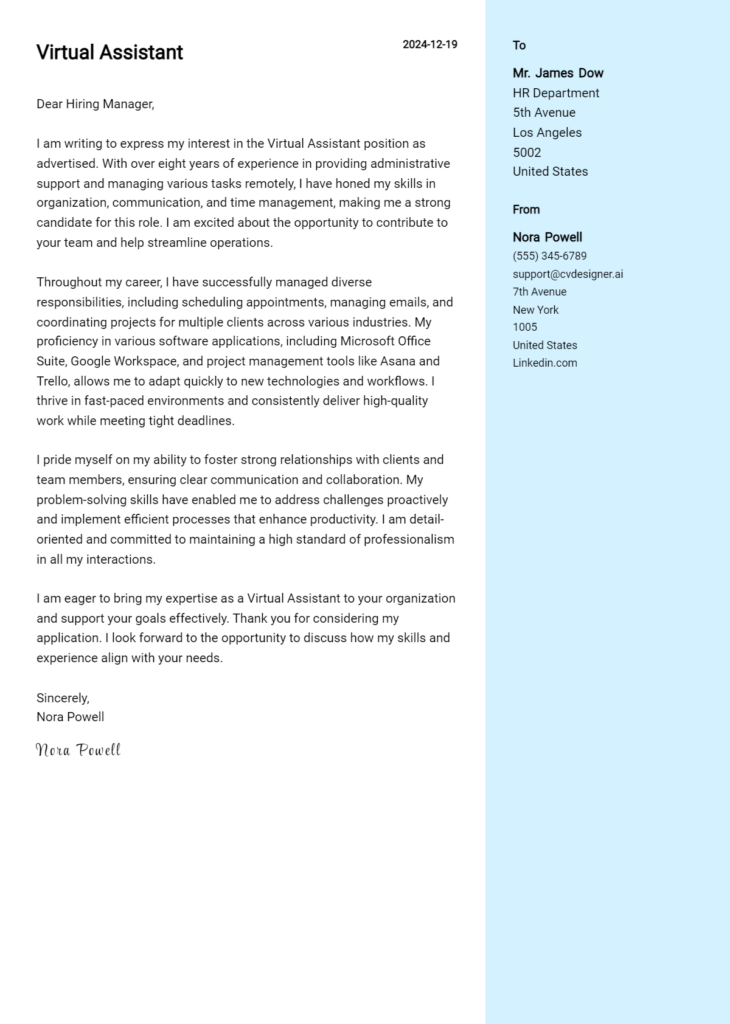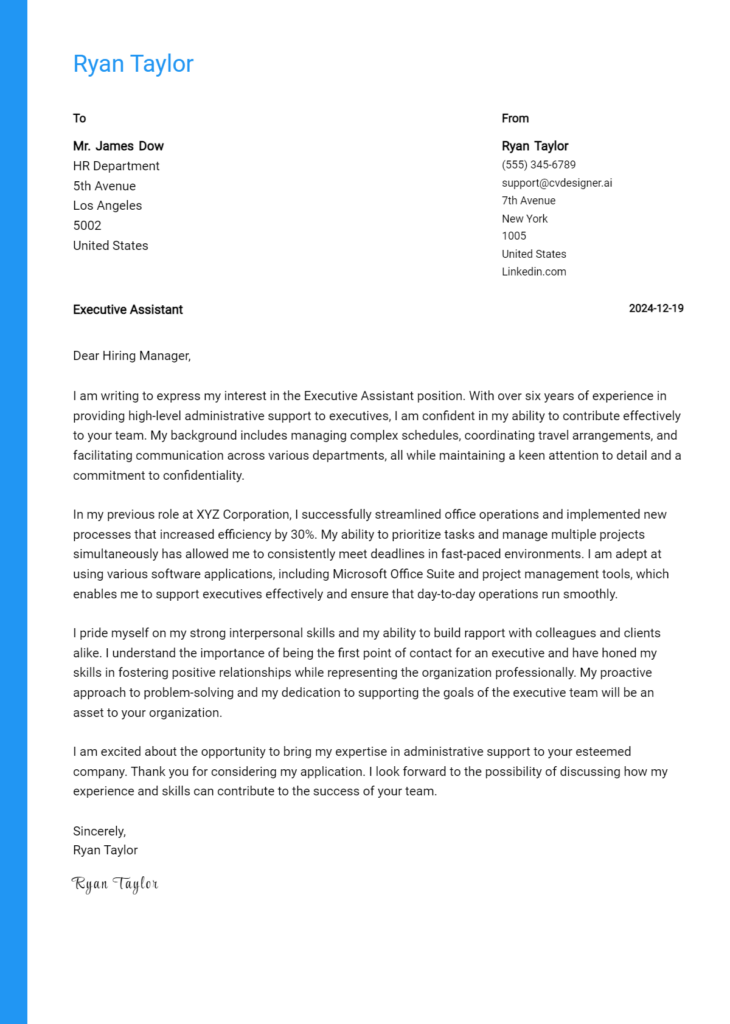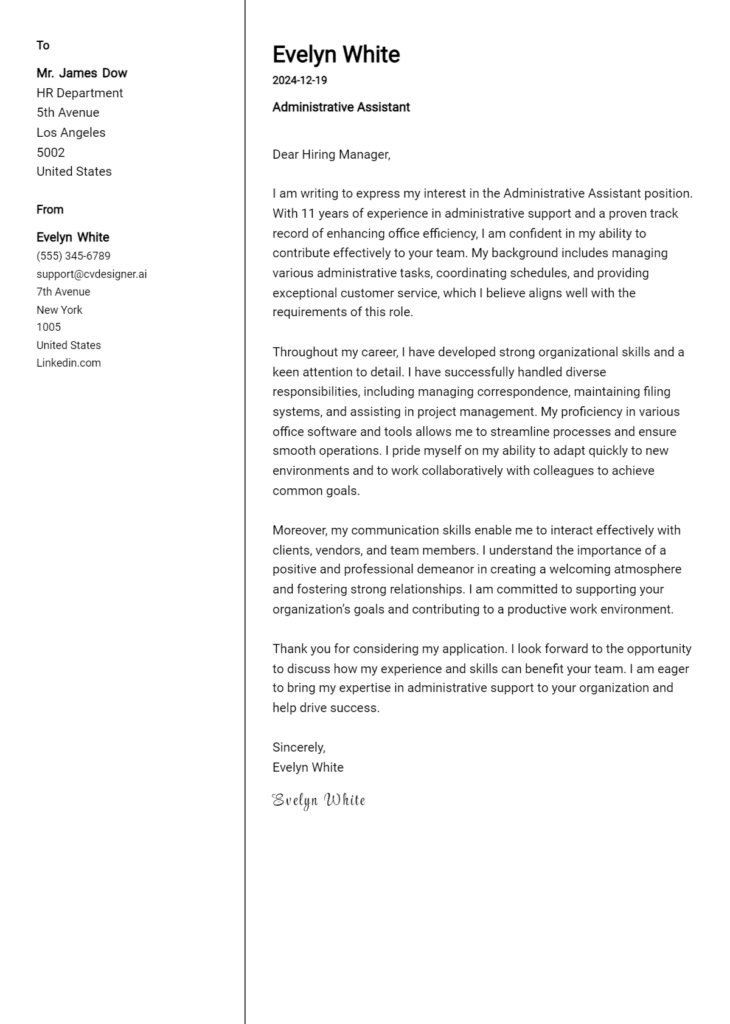Executive Assistant 2 Cover Letter Examples
Explore additional Executive Assistant 2 cover letter samples and guides and see what works for your level of experience or role.
How to Format an Executive Assistant Cover Letter?
Crafting a compelling cover letter is essential for an Executive Assistant, as it not only showcases your qualifications but also reflects your organizational skills and professionalism. The way you format your cover letter speaks volumes about your attention to detail and ability to communicate effectively—key attributes in an Executive Assistant role. A well-structured cover letter can capture the hiring manager's attention, making a strong first impression that sets the tone for the rest of your application.
In this guide, we will outline how to properly format your cover letter, providing insights and examples tailored specifically for Executive Assistants.
We will focus on the essential components of a professional cover letter, including:
- Cover Letter Header
- Cover Letter Greeting
- Cover Letter Introduction
- Cover Letter Body
- Cover Letter Closing
Each section is crucial for presenting your qualifications and enhancing your candidacy. Let’s delve into each part and explore how to make your Executive Assistant cover letter stand out.
Importance of the Cover Letter Header for an Executive Assistant
The cover letter header is a crucial element of any professional correspondence, particularly for an Executive Assistant role. It sets the tone for the entire letter and provides essential information at a glance. A well-structured header should include your contact information, the date, and the recipient's details, ensuring clarity and professionalism. This not only facilitates communication but also demonstrates your attention to detail—an important trait for an Executive Assistant.
A strong header conveys confidence and organization, while a weak header can create an immediate negative impression. Below are examples of a strong and weak cover letter header for an Executive Assistant.
Strong Example
Jane Doe 123 Main Street City, State, ZIP janedoe@email.com (123) 456-7890 October 5, 2023 Mr. John Smith Hiring Manager Company Name 456 Business Rd. City, State, ZIP
Weak Example
jane doe email: janedoe@email.com 10/5/23 hi there,
The Importance of the Cover Letter Greeting for an Executive Assistant
The greeting of your cover letter serves as the first impression you make on a potential employer, setting the tone for the entire document. A well-crafted greeting demonstrates professionalism and shows that you have taken the time to personalize your application by addressing the hiring manager directly. This personal touch can make a significant difference, as hiring managers often appreciate candidates who show genuine interest in the role and the company. To avoid generic greetings that can dilute your message, it’s essential to research the recipient's name, whether through the company’s website or professional networking platforms like LinkedIn. A personalized greeting can convey your enthusiasm and respect for the position, making your application stand out.
Strong Greeting Example
Dear Ms. Johnson,
Weak Greeting Example
To Whom It May Concern,
The Importance of a Strong Cover Letter Introduction for an Executive Assistant
A well-crafted cover letter introduction is crucial for an Executive Assistant role, as it sets the tone for the entire application and serves as the first impression for the hiring manager. This initial paragraph should not only capture the reader's attention but also express the candidate’s enthusiasm for the position. Additionally, it provides an opportunity to briefly showcase key skills or notable achievements that align with the job description. A strong introduction can distinguish a candidate from the competition, making it essential to strike the right balance between professionalism and personality.
Strong Example
Dear [Hiring Manager's Name], I am excited to apply for the Executive Assistant position at [Company Name], where my extensive experience in administrative support and exceptional organizational skills can contribute to your team's success. With over five years of experience managing complex schedules and coordinating high-stakes meetings for senior executives, I have a proven track record of enhancing operational efficiency and fostering effective communication within the organization.
Weak Example
To whom it may concern, I am writing to apply for the Executive Assistant job. I have done administrative work before, and I think I would be a good fit for the role. I can answer phones and take notes in meetings.
Cover Letter Body for Executive Assistant
The cover letter body for an Executive Assistant serves as a critical platform for candidates to articulate their skills, experiences, and the unique value they can bring to the organization. This section allows applicants to provide concrete examples of their previous work, showcasing specific projects or accomplishments that demonstrate their ability to manage complex schedules, coordinate high-stakes meetings, and support executive leadership effectively. By detailing their organizational prowess, communication skills, and problem-solving capabilities, candidates can effectively position themselves as indispensable assets to potential employers.
Strong Example
Dear Hiring Manager, I am excited to apply for the Executive Assistant position at XYZ Corporation. In my previous role at ABC Company, I successfully managed the calendar for the CEO, scheduling over 150 meetings per month while ensuring no conflicts arose. I spearheaded a project to streamline our travel booking process, which reduced costs by 20% and improved overall efficiency. Additionally, my experience in preparing detailed reports and presentations enabled me to support executive decision-making effectively. I am confident that my proactive approach and commitment to excellence will contribute positively to your team. Sincerely, Jane Doe
Weak Example
Dear Hiring Manager, I am applying for the Executive Assistant job. I have worked as an assistant before and know how to use a calendar. I think I would be good for the job. I can answer emails and make phone calls. I am looking for a new opportunity and hope to hear from you soon. Best, John Smith
Importance of the Cover Letter Closing for an Executive Assistant
The closing paragraph of a cover letter is crucial for leaving a lasting impression on potential employers. It provides an opportunity to summarize your qualifications, reiterate your enthusiasm for the role, and encourage the hiring manager to take the next steps, such as reviewing your resume or scheduling an interview. A well-crafted closing can effectively reinforce your fit for the Executive Assistant position and demonstrate your professionalism. Below are examples of both a strong and a weak closing paragraph.
Strong Example
Thank you for considering my application for the Executive Assistant position. With my extensive experience in office administration and proven ability to manage multiple tasks efficiently, I am excited about the opportunity to contribute to your team. I believe my skills align perfectly with your needs, and I would welcome the chance to discuss how I can support your organization's goals. I look forward to the possibility of an interview and discussing my application further.
Weak Example
Thanks for reading my letter. I think I would be good at this job. Please look at my resume if you want. I hope to hear from you.
These tips will help candidates craft an effective cover letter for an Executive Assistant position, emphasizing the key attributes that employers seek. In a competitive job market, it's essential to showcase not only your technical skills and problem-solving abilities but also your knowledge of the Software Development Life Cycle (SDLC), teamwork capabilities, and a passion for continuous learning. A well-crafted cover letter can set you apart from other candidates, so let's explore some strategies to highlight these qualities.
Tips for Writing an Effective Executive Assistant Cover Letter
Highlight Technical Skills: Start your cover letter by detailing your technical skills relevant to the Executive Assistant role. Mention proficiency in tools such as Microsoft Office Suite, project management software, or any CRM platforms you’ve used. Including specific examples of how you utilized these tools to improve efficiency in previous roles can make a strong impression.
Emphasize Problem-Solving Abilities: Use your cover letter to showcase your problem-solving skills. Provide a brief anecdote that illustrates how you resolved a challenging situation in the workplace. This not only demonstrates your ability to think critically but also shows your resourcefulness and initiative.
Demonstrate SDLC Knowledge: If applicable, discuss your understanding of the Software Development Life Cycle. Highlight any experience you have working alongside development teams, managing project timelines, or coordinating meetings. This will show your potential employer that you can effectively support technical teams and contribute to project success.
Showcase Teamwork and Collaboration: Executive Assistants often work closely with various departments. Highlight your teamwork skills by mentioning specific projects where collaboration was key. Discuss how you facilitated communication between departments or helped to organize cross-functional meetings to achieve common goals.
Express a Passion for Continuous Learning: Finally, convey your commitment to professional development. Mention any courses, certifications, or workshops you’ve attended that enhance your skills as an Executive Assistant. This reflects a proactive attitude toward growth, which is attractive to employers seeking adaptable and motivated team members.
By following these tips, you can create a compelling cover letter that captures the attention of hiring managers. For additional support, consider exploring cover letter templates or using a cover letter builder to refine your application further.
Common Mistakes to Avoid in a Executive Assistant Cover Letter
Crafting a compelling cover letter is essential for standing out as an Executive Assistant candidate. Avoiding common mistakes can significantly enhance your chances of making a positive impression. Here are some frequent pitfalls to watch out for:
Generic Content: Using a one-size-fits-all approach can be detrimental. Tailor your letter to the specific role and company by mentioning relevant skills and experiences.
Ignoring Job Requirements: Failing to address the key qualifications listed in the job description can signal a lack of attention to detail. Always align your skills with what the employer seeks.
Too Much Length: A cover letter should be concise. Aim for a length of about one page and focus on the most relevant information.
Overused Phrases: Clichés and buzzwords can make your letter sound insincere. Instead, use specific examples that demonstrate your capabilities.
Poor Formatting: A cluttered or unprofessional layout can detract from your message. Refer to a proper cover letter format to ensure your document looks polished.
Spelling and Grammar Errors: Typos can create a negative impression. Always proofread your letter or use tools to catch mistakes.
Lack of Enthusiasm: Failing to express genuine interest in the position can make your letter forgettable. Convey your excitement about the opportunity and the company culture.
By steering clear of these common mistakes and following best practices, you can create an effective cover letter that showcases your qualifications for the Executive Assistant role. For inspiration, consider checking out some cover letter examples.
Cover Letter FAQs for Executive Assistant
What should I include in my cover letter for an Executive Assistant position?
In your cover letter for an Executive Assistant role, it's essential to highlight your organizational skills, attention to detail, and ability to manage multiple tasks. Start with a strong introduction that specifies the position you're applying for. Detail your relevant experience, such as managing schedules, coordinating meetings, and handling communication. Include specific examples of how you've contributed to past employers' success, like improving office efficiency or implementing new administrative systems. Don’t forget to showcase your interpersonal skills, as Executive Assistants often serve as a liaison between executives and other stakeholders. Finally, express your enthusiasm for the role and the company, demonstrating your alignment with their values and goals.
How do I address my cover letter for an Executive Assistant position?
When addressing your cover letter, find out the name of the hiring manager if possible. A personalized greeting like "Dear [Hiring Manager's Name]" shows that you've done your research and are genuinely interested in the position. If you can't find a specific name, using "Dear Hiring Manager" is a suitable alternative. Avoid generic salutations like "To Whom It May Concern," as they can come off as impersonal. Following the greeting, transition smoothly into your introduction, capturing the reader's attention with your enthusiasm for the role and the value you can bring to the team.
How can I make my cover letter stand out for an Executive Assistant role?
To make your cover letter stand out, tailor it specifically to the job description. Highlight relevant skills and experiences that directly relate to the responsibilities of the Executive Assistant position. Use quantifiable achievements to showcase your impact, such as "streamlined scheduling processes, reducing appointment conflicts by 30%." Incorporate keywords from the job listing to demonstrate your alignment with the company's needs. Additionally, infuse your personality into the letter, showing your passion for administrative work and your understanding of the executive's role. A well-structured, error-free letter that showcases both your professional qualifications and your enthusiasm will help you stand out from other candidates.
Should I include my resume with my cover letter for an Executive Assistant application?
Yes, you should always include your resume with your cover letter when applying for an Executive Assistant position. The cover letter serves as an introduction and highlights your most relevant experiences and skills, while your resume provides a comprehensive overview of your work history and qualifications. Make sure to reference your resume in your cover letter, pointing out specific sections or accomplishments that align with the job requirements. This encourages the hiring manager to review your resume in conjunction with your cover letter, giving them a complete picture of your candidacy. Additionally, ensure that both documents are formatted consistently and professionally to reinforce your attention to detail.
Build your Cover Letter in minutes
Use an AI-powered cover letter builder and have your letter done in 5 minutes. Just select your template and our software will guide you through the process.

